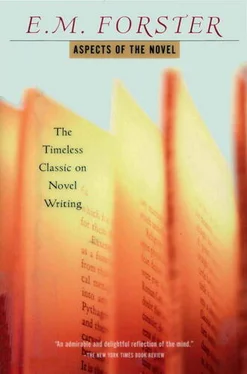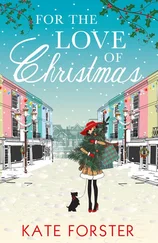That then is the disadvantage of a rigid pattern. It may externalize the atmosphere, spring naturally from the plot, but it shuts the doors on life and leaves the novelist doing exercises, generally in the drawing-room. Beauty has arrived, but in too tyrannous a guise. In plays—the plays of Racine, for instance—she may be justified because beauty can be a great empress on the stage, and reconcile us to the loss of the men we knew. But in the novel, her tyranny as it grows powerful grows petty, and generates regrets which sometimes take the form of books like Boon. T o put it in other words, the novel is not capable of as much artistic development as the drama: its humanity or the grossness of its material hinder it (use whichever phrase you like). To most readers of fiction the sensation from a pattern is not intense enough to justify the sacrifices that made it, and their verdict is "Beautifully done, but not worth doing."
Still this is not the end of our quest. We will not give up the hope of beauty yet. Cannot it be introduced into fiction by some other method than the pattern? Let us edge rather nervously towards the idea of "rhythm."
Rhythm is sometimes quite easy. Beethoven's Fifth Symphony, for instance, starts with the rhythm "diddidy dum", which we can all hear and tap to. But the symphony as a whole has also a rhythm—due mainly to the relation between its movements—which some people can hear but no one can tap to. This second sort of rhythm is difficult, and whether it is substantially the same as the first sort only a musician could tell us. What a literary man wants to say though is that the first kind of rhythm, the diddidy dum, can be found in certain novels and may give them beauty. And the other rhythm, the difficult one—the rhythm of the Fifth Symphony as a whole—I cannot quote you any parallels for that in fiction, yet it may be present.
Rhythm in the easy sense, is illustrated by the work of Marcel Proust. [11] The first three books of A la recherche du temps perdu have been excellently translated by C. K. Scott Moncrieff under the title of Remembrance of Things Past, A. & C. Boni.
Proust's conclusion has not been published yet, and his admirers say that when it comes everything will fall into its place, times past will be recaptured and fixed, we shall have a perfect whole. I do not believe this. The work seems to me a progressive rather than an aesthetic confession, and with the elaboration of Albertine the author was getting tired. Bits of news may await us, but it will be surprising if we have to revise our opinion of the whole book. The book is chaotic, ill-constructed, it has and will have no external shape; and yet it hangs together because it is stitched internally, because it contains rhythms.
There are several examples (the photographing of the grandmother is one of them) but the most important from the binding point of view is his use of the "little phrase" in the music of Vinteuil. It does more than anything else—more even than the jealousy which successively destroys Swann, the hero, and Charlus—to make us feel that we are in a homogeneous world. We first hear Vinteuil's name in hideous circumstances. The musician is dead—an obscure little country organist, unknown to fame—and his daughter is defiling his memory. The horrible scene is to radiate in several directions, but it passes, we forget about it.
Then we are at a Paris salon. A violin sonata is performed and a little phrase from its andante catches the ear of Swann and steals into his life. It is always a living being, but takes various forms. For a time it attends his love for Odette. The love affair goes wrong, the phrase is forgotten, we forget it. Then it breaks out again when he is ravaged by jealousy, and now it attends his misery and past happiness at once, without losing its own divine character. Who wrote the sonata? On hearing it is by Vinteuil, Swann says, "I once knew a wretched little organist of that name—it couldn't be by him." But it is, and Vinteuil's daughter and her friend transcribed and published it.
That seems all. The little phrase crosses the book again and again, but as an echo, a memory; we like to encounter it, but it has no binding power. Then, hundreds and hundreds of pages on, when Vinteuil has become a national possession, and there is talk of raising a statue to him in the town where he has been so wretched and so obscure, another work of his is performed—a posthumous sextet. The hero listens—he is in an unknown rather terrible universe while a sinister dawn reddens the sea. Suddenly for him and for the reader too, the little phrase of the sonata recurs—half heard, changed, but giving complete orientation, so that he is back in the country of his childhood with the knowledge that it belongs to the unknown.
We are not obliged to agree with Proust's actual musical descriptions (they are too pictorial for my own taste): but what we must admire is his use of rhythm in literature, and his use of something which is akin by nature to the effect it has to produce—namely a musical phrase. Heard by various people—first by Swann, then by the hero—the phrase of Vinteuil is not tethered; it is not a banner such as we find George Meredith using—a double-blossomed cherry tree to accompany Clara Middleton, a yacht in smooth waters for Cecilia Halkett. A banner can only reappear, rhythm can develop, and the little phrase has a life of its own, unconnected with the lives of its auditors, as with the life of the man who composed it. It is almost an actor, but not quite, and that "not quite" means that its power has gone towards stitching Proust's book together from the inside, and towards the establishment of beauty and the ravishing of the reader's memory. There are times when the little phrase—from its gloomy inception, through the sonata into the sextet—means everything to the reader. There are times when it means nothing and is forgotten, and this seems to me the function of rhythm in fiction; not to be there all the time like a pattern, but by its lovely waxing and waning to fill us with surprise and freshness and hope.
Done badly, rhythm is most boring, it hardens into a symbol and instead of carrying us on it trips us up. With exasperation we find that Galsworthy's spaniel John, or whatever it is, lies under the feet again; and even Meredith's cherry trees and yachts, graceful as they are, only open the windows into poetry. I doubt that it can be achieved by the writers who plan their books beforehand, it has to depend on a local impulse when the right interval is reached. But the effect can be exquisite, it can be obtained without mutilating the characters, and it lessens our need of an external form.
That must suffice on the subject of easy rhythm in fiction: which may be defined as repetition plus variation, and which can be illustrated by examples. Now for the more difficult question. Is there any effect in novels comparable to the effect of the Fifth Symphony as a whole, where, when the orchestra stops, we hear something that has never actually been' played? The opening movement, the andante, and the trio-scherzo-trio-finale-trio-finale that composes the third block, all enter the mind at once, and extend one another into a common entity. This common entity, this new thing, is the symphony as a whole, and it has been achieved mainly (though not entirely) by the relation between the three big blocks of sound which the orchestra has been playing. I am calling this relation "rhythmic". If the correct musical term is something else, that does not matter; what we have now to ask ourselves is whether there is any analogy to it in fiction.
I cannot find any analogy. Yet there may be one; in music fiction is likely to find its nearest parallel.
The position of the drama is different. The drama may look towards the pictorial arts, it may allow Aristotle to discipline it, for it is not so deeply committed to the claims of human beings. Human beings have their great chance in the novel. They say to the novelist: "Recreate us if you like, but we must come in," and the novelist's problem, as we have seen all along, is to give them a good run and to achieve something else at the same time. Whither shall he turn? not indeed for help but for analogy. Music, though it does not employ human beings, though it is governed by intricate laws, nevertheless does offer in its final expression a type of beauty which fiction might achieve in its own way. Expansion. That is the idea the novelist must cling to. Not completion. Not rounding off but opening out. When the symphony is over we feel that the notes and tunes composing it have been liberated, they have found in the rhythm of the whole their individual freedom. Cannot the novel be like that? Is not there something of it in War and Peace ?—the book with which we began and in which we must end. Such an untidy book. Yet, as we read it, do not great chords begin to sound behind us, and when we have finished does not every item—even the catalogue of strategies—lead a larger existence than was possible at the time?
Читать дальше












